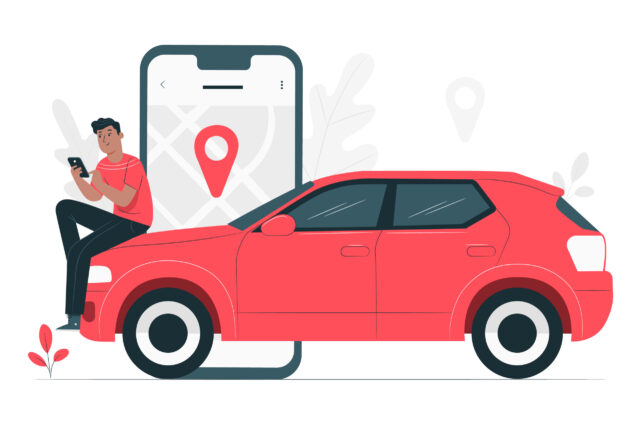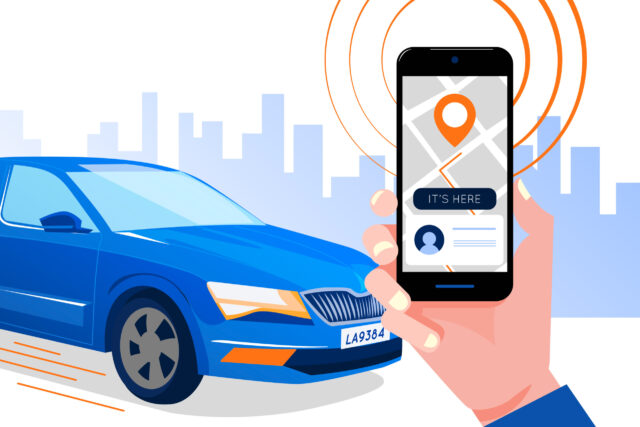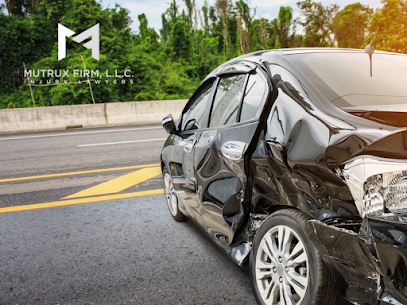Can You Sue Uber or Lyft for an Accident?
The popularity of rideshare services is on the rise, especially when it comes to companies like Uber and Lyft, as they have singlehandedly transformed how people travel. They are convenient, affordable, and accessible platforms that have become some of the most integral parts of modern urban transportation. However, due to this increase in rideshare services comes an increase in accidents and other issues involving Uber and Lyft vehicles. This raises a critical question: can you sue Uber or Lyft for an accident? Learn more with the dedicated attorneys at Mutrux Firm today!
Rideshare companies are unique and share the same business model through a mobile app. They do not own their own vehicles and the drivers act as intermediaries. This unique model allows rideshare companies flexibility, operates cost-efficiently, and caters to almost every town and city throughout the country. Let’s take a closer look at the rideshare services business model.
The business model for rideshare services is simple; they use a mobile app to connect passengers with drivers. This business model allows rideshare companies such as Uber and Lyft to remain flexible and cost-efficient. However, it is important to note that it also blurs the lines when it comes to the legalities should an Uber or Lyft accident occur.
The Driver-Passenger Relationship
Uber and Lyft drivers are not direct employees of the companies, rather, they are considered independent contractors. This is critical in the legal side of things, as in the event an accident occurs, the drivers are considered self-employed. This model works out well for the rideshare companies, as it allows them to limit their legal responsibilities, however, it makes it more difficult for accident victims to hold these rideshare companies accountable.
Types of Accidents Involving Uber and Lyft
Accidents involving Uber and Lyft can occur in various scenarios, each with distinct legal implications:
- Passenger Injuries: Passengers can be injured while riding in an Uber or Lyft vehicle. In such cases, the primary concern is whether the rideshare company’s insurance policy will cover the injuries.
- Driver Injuries: Rideshare drivers themselves can be injured in accidents. They may seek compensation through the rideshare company’s insurance or their personal insurance, depending on the circumstances.
- Third-Party Injuries: Pedestrians, cyclists, or occupants of other vehicles can be injured in collisions involving an Uber or Lyft vehicle. Determining liability in these cases can be complex, involving multiple parties and insurance policies.
- Property Damage: Accidents can also result in property damage, such as damage to other vehicles, buildings, or infrastructure. Again, the responsibility for covering these damages depends on the specifics of the accident and the insurance policies involved.
Insurance coverage can be tricky when it comes to rideshare accidents; however, Uber and Lyft both provide coverage for their drivers. However, again, this works out in the favor of rideshare companies. Let’s take a closer look below.
Uber and Lyft Insurance Policies
Both Uber and Lyft give their drivers insurance coverage, however, the extent of this coverage varies depending on the driver’s status when the accident occurs.
- Offline or App Off: When the driver is not using the rideshare app, their personal auto insurance is the primary coverage. Uber and Lyft do not provide any coverage during this period.
- App On, No Ride Request: When the driver is logged into the app but has not accepted a ride request, Uber and Lyft provide limited liability coverage. This coverage typically includes:
- $50,000 per person for bodily injury
- $100,000 per accident for bodily injury
- $25,000 per accident for property damage
- En Route to Pick Up: When the driver has accepted a ride request and is on the way to pick up the passenger, Uber and Lyft offer more extensive coverage:
- $1 million in third-party liability
- Contingent comprehensive and collision coverage (if the driver has personal comprehensive and collision coverage)
- During the Ride: Once the passenger is in the vehicle, Uber and Lyft provide the highest level of coverage:
- $1 million in third-party liability
- Uninsured/underinsured motorist bodily injury coverage
- Contingent comprehensive and collision coverage
Personal Auto Insurance
Although Uber and Lyft provide insurance to their drivers, they still require an active auto insurance policy. The catch here is that their personal insurance policy does not cover the passengers in their vehicle at the time they are working. This creates a gap in coverage, and this is where rideshare insurance comes into play. The next step gets a little tricky, as the drivers have to make sure that their personal insurance coverage is compatible with the insurance coverage provided by the rideshare services.
Legal Framework for Suing Uber or Lyft
There are a few things to consider when suing an Uber or Lyft driver: their status as an independent contractor, vicarious liability, negligence, and direct liability.
Independent Contractor Status
First, it is important to recognize the driver’s status as an independent contractor and the challenges an accident victim might face when suing Uber or Lyft for an accident. Because their drivers are independent contractors, Uber and Lyft distance themselves from direct liability for the actions of their drivers. It’s no surprise that this has been a touchy subject throughout the legal field, especially when it comes to litigation.
Vicarious Liability
Vicarious liability holds the employers responsible for the actions of their employees or agents. However, because rideshare drivers are independent contractors, it is quite difficult for your attorney to apply vicarious liability to these companies. Some of the things that the courts can take into account include the relationship between the parties, in this case, between the rideshare service and their driver to determine whether or not vicarious liability can be applied.
Negligence and Direct Liability
It’s important not to forget about negligence, as these rideshare companies can be held liable for an accident if they fail to screen the driver properly, or provide insufficient training. Let’s take a closer look below.
- Inadequate Driver Screening: If the rideshare company fails to conduct proper background checks or allows an unqualified driver to operate on their platform, they could be held liable for the resulting accidents.
- Insufficient Training: If the company did not provide adequate training or guidelines for safe driving practices, this could form the basis for a negligence claim.
- Failure to Address Known Safety Issues: If the company was aware of safety issues with a driver or vehicle and did not take appropriate action, they could be liable for any resulting accidents.
State and Local Regulations
Of course, state and local regulations play a significant part in how the legalities of your case will be dealt with. Rideshare companies work under state and local regulations, which can have a significant impact on the legal landscape for holding these companies accountable. Some of the most common state and local regulations include a background check for the drivers, insurance requirements, and operational standards. This is why it is so important for you to hire an attorney, as they will be the ones who know the legal system within their jurisdiction, and can handle the case accordingly.
Steps to Take After an Uber or Lyft Accident
At Mutrux Firm, we understand how traumatic an accident can be, therefore, the first thing you should do is make sure that all the individuals involved are safe and out of harm’s way. If you were involved in an Uber or Lyft accident, here are a couple of things to consider.
- Seek Medical Attention: Ensure that all injured parties receive prompt medical care. Even if injuries appear minor, it is important to document them as they may become more apparent over time.
- Report the Accident: Contact local law enforcement to report the accident and obtain an official police report. This report will be a crucial piece of evidence in any subsequent legal proceedings.
- Document the Scene: Take photographs and videos of the accident scene, including vehicle damage, road conditions, and any visible injuries. Collect contact information for witnesses and involved parties.
- Notify Uber or Lyft: Report the accident to the rideshare company through their app or customer service channels. This notification will initiate their internal investigation and claims process.
- Consult an Attorney: Contact a personal injury attorney experienced in rideshare accident cases. An attorney can help you understand your legal options, gather evidence, and negotiate with insurance companies or pursue litigation if necessary.
Pursuing a Claim Against Uber or Lyft
Pursuing a claim against these rideshare companies is no easy task. Let’s check out how you can pursue a claim against these companies, and get the compensation that you deserve.
Filing an Insurance Claim
After you have been involved in an accident with an Uber or Lyft driver, the first thing to do is to file an insurance claim. However, this depends on the specifics of the accident, as they claim could be filed with a number of different parties, including:
- The rideshare driver’s personal insurance company
- Uber or Lyft’s insurance provider
- The insurance company of another involved party (e.g., another driver)
Again, we cannot stress enough the importance of an attorney when it comes to a rideshare accident, as they will know which insurance to get in touch with and will be your guide through the entire claims process. Keep in mind that it is important to provide the insurance company with a detailed account of the incident, any injuries you might have sustained, and other damages that could support your claim.
Negotiating a Settlement
Like in many car accident cases, insurance companies prefer to settle all disputes outside of court, as litigation requires additional resources and could lead to more expense for the insurance company. This is again where your attorney steps in and negotiates with the insurance company to make sure that you receive the compensation you deserve. Some of the most common damages to receive in a rideshare accident include medical expenses, lost wages, property damage, and pain and suffering. Having an attorney by your side is crucial to make sure you receive the settlement you’re looking for.
Filing a Lawsuit
In the case where the insurance company does not settle, the case will proceed to litigation. This will require your attorney to file a lawsuit against Uber, Lyft, or other liable parties. Let’s check out the process of filing a lawsuit so you can have a better idea of what it entails:
- Complaint: Your attorney will draft a legal complaint outlining the facts of the case, the legal basis for the claim, and the damages sought. This complaint is filed with the appropriate court.
- Discovery: During the discovery phase, both parties exchange information and evidence related to the case. This may include depositions, interrogatories, and requests for documents.
- Motions: Either party may file pre-trial motions to resolve certain legal issues or seek to dismiss the case. The court will rule on these motions based on the arguments and evidence presented.
- Trial: If the case proceeds to trial, both sides will present their evidence and arguments to a judge or jury. The judge or jury will then decide whether the defendant is liable and, if so, the amount of damages to be awarded.
- Appeals: If either party is dissatisfied with the trial outcome, they may appeal the decision to a higher court. The appeals process can extend the duration of the case and involves additional legal arguments and rulings.
So, can you sue Uber or Lyft for an accident? Yes! However, there are a few more barriers to break down, which is why it is crucial to have a dedicated attorney by your side to help you navigate the complex legal landscape. The attorneys at Mutrux Firm are here to help you throughout the process and make sure that you receive the justice you deserve.
Want to learn more about how Mutrux Firm can help you with your rideshare accident case? Give us a call at (888) 550-4026 or contact us here for more information. We look forward to working with you and only want the best possible result to help you get your life back on track!
- Can You Claim a Car Accident Without a Police Report in Mo.? - July 12, 2024
- Who Pays for a Rental Car After an Accident? - July 8, 2024
- How Much Compensation Can I Receive for a Hit & Run Accident? - June 28, 2024



